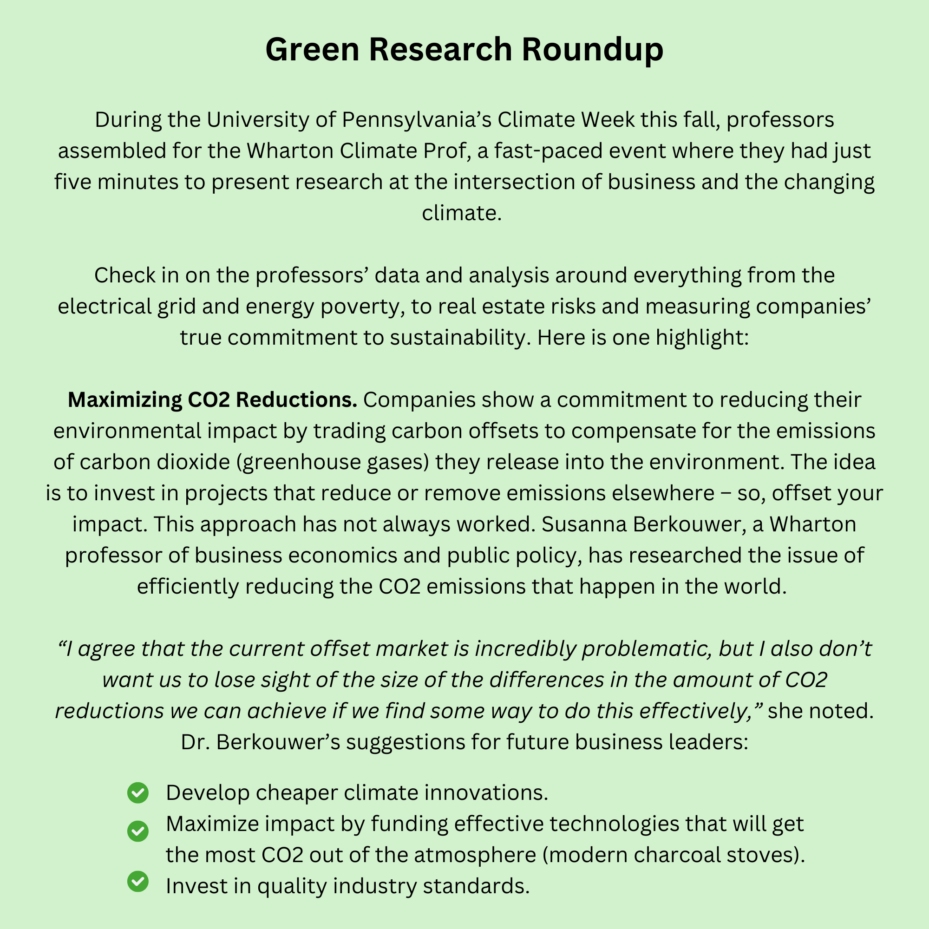3 Questions for Sarah Light of Wharton’s Climate Center


The Wharton Climate Center, which studies climate change, renewable energy, air and water pollution and biodiversity, and is part of the Wharton School’s ESG (environmental, social and governance) Initiative, is co-directed by Sarah E. Light, a Wharton professor of legal studies and business ethics. We caught up with Dr. Light recently to ask a few questions about business and the environment.
Wharton Global Youth Program: Where does the market stand in balancing growth and business priorities with ESG commitments? Specifically, are companies aligning environmental concerns with profitability?
Sarah Light: This is a complicated time for ESG. On the one hand, jurisdictions like the European Union and California are moving forward with mandatory rules on disclosure of ESG factors in financial reporting, so global firms doing business in multiple markets have not only some private (shareholder) pressure to take these environmental, social and governance factors into account, but also legal rules requiring them to disclose how they manage risks, consider opportunities and govern these issues. In addition, market forces require many firms – think of the insurance industry as an obvious example – to take climate risk into account. On the other hand, some states within the U.S. have adopted laws that prohibit the states from doing business with financial companies that take ESG factors into account. I would anticipate at the very least that there will be significant rollbacks of regulations by the federal government starting in January; whether the federal government will go as far as the states is unclear.
Wharton Global Youth: What are the main challenges businesses face when trying to implement ESG initiatives related to climate?
Dr. Light: I think there are of course the political factors noted above. In addition, some of the challenges relate to the measurement of emissions, especially within a firm’s value chain. There are protocols in place to estimate supply chain and downstream (so-called Scope 3) emissions, but there are assumptions that come into play, and this poses some challenges.
Wharton Global Youth: How do you see the role of artificial intelligence evolving in the context of ESG and climate action?
Dr. Light: AI may be both great and terrible. AI shows enormous promise in certain areas like optimizing the [electric] grid’s efficiency, for example, as well as in climate modeling and weather prediction, which is extremely important for disaster prevention and resilience. But AI is hugely energy and water-intensive. A search using ChatGPT can use eight times the energy as a Google search. When people are looking up recipes or generating an itinerary for vacations using AI and Large Language Models (LLMs), I don’t think most people realize the energy costs.

Why is it a complicated time for the ESG movement?
How is AI both useful and harmful to the environment?
What are carbon offsets and how are they an example of how business is committed to helping the environment? Dr. Berkouwer mentions that carbon offsets are problematic. Research this topic and discuss some of the problems in class.
What else can you learn from the Wharton Climate Prof? Choose one of the other short presentations linked in this article and discuss key takeaways in class.
It is an extremely complicated time for the ESG movement. This is due to new legislation creating firms to try and find ways around reporting. Personally, I am extremely passionate about environmental economics & ESG. I think that AI can be useful to the environment in a sense that it can give valuable ideas for things such as community cleanups, but as Dr.Light said, it uses so much energy when prompting AI, so it cancels out. In my opinion Environmental, Social, & Governance is a very interesting topic. I think that society could use more ESG analysts to regulate large corporations to ensure all business factors, including fair labor, sustainability, & long term growth. As the founder of The Green Guru Project I have a significant role to promote sustainable economic solutions both locally and globally. I’m doing an ESG analyst internship, and I hope that one day I can attend a lecture at The Wharton School from Dr. Light. As the world works toward 2030, ESG is a looming topic and especially the sustainable aspect of how all the nations are slowly working towards the SDG’s. With the Green Guru Project I am trying to help SDG’s 2,8, &13 which are zero hunger, economic development, and climate action. I hope that we can all come together to learn from Dr. Light to make the globe more sustainable.
“Business is where solutions scale.” That quote from Professor Light hit me. It’s something I’ve seen firsthand through the projects I lead at The Green Guru Project, a 501(c)(3) dedicated to environmental economic impact. In fact, Dr.Light actually inspired me to start in 2023 when I first read about her ESG initiative, and now I hope to study ESG at the Wharton School.
When The Green Guru Project partnered with a Forbes30U30 company to deliver food-to-energy machine across Florida schools, it wasn’t just a climate win. In fact, it created job exposure, reduced food waste, and educated students. At the same time this past summer I was a summer analyst at a wealth firm where I practiced ESG regulation of bulge bracket companies such as JP Morgan & Goldman Sachs.
Climate change is an environmental economic issue and it is up to individuals such as Dr.Light & myself to help advocate for changes. Climate change is an economic issue, and business is where incentives drive change. Dr. Light said it herself, that the government will not be the root of climate action, but rather society, and I hope to be a part of those leaders.